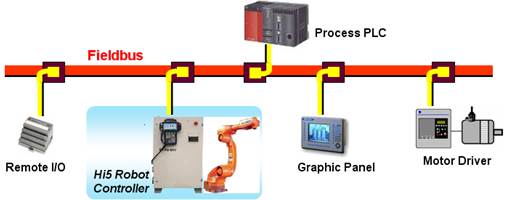1.2. About the field bus
1.2. About the field bus
Field bus is an open industrial standard for operating systems in factories, such as sensors, buttons, motor drivers, and operation interfaces by connecting them to a PLC (Programmable Logic Controller) through a single cable.
Field bus provides intelligent services, such as monitoring the state of the overall network state from the center or reconfiguring it. For example, it is advantageous in terms of sending and receiving more detailed information (including operation mode setting and defectiveness of sensors) about sensors and switches and not just the on or off state.
As field bus uses a single cable, the time and cost for wiring can be reduced, and maintenance can be carried out easily because of the simple wiring configuration.
In addition, different from the protocols with the nondeterministic response property, such as Ethernet, the data response speed is guaranteed, making it satisfactorily appropriate for industries in which the threshold time property is critical.

Figure1.1 Field bus network, master, and slave units
One field bus network includes one master unit and multiple slave units connected. The master unit is for searching and managing the overall network and exchange data with slave units. In general, PLC is the master and the other units, such as sensors, buttons and controllers, are slave units.